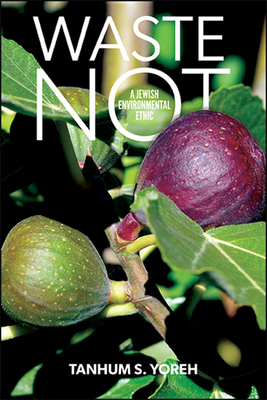Waste Not

Waste Not
Bal tashḥit, the Jewish prohibition against wastefulness and destruction, is considered to be an ecological ethical principle by contemporary Jewish environmentalists. Waste Not provides a comprehensive intellectual history of this concept, charting its evolution from the Bible through classical rabbinic literature, commentaries, codes of law, responsa, and the works of modern environmentalists. Tanhum S. Yoreh uses the methodology of tradition histories to identify pivotal moments in the development of the prohibition--in particular, its transition into an economic framework. He finds that bal tashḥit's earliest stages of conceptualization connect the prohibition against wastefulness with avoidance of self-harm. This connection is commonplace within contemporary environmental thought and a universalizing Jewish principle with important contributions to be made to Jewish and general societal ecological discourse. This narrative provides a foundation for understanding bal tashḥit as an environmental ethic for today and tomorrow.
Bal tashḥit, the Jewish prohibition against wastefulness and destruction, is considered to be an ecological ethical principle by contemporary Jewish environmentalists. Waste Not provides a comprehensive intellectual history of this concept, charting its evolution from the Bible through classical rabbinic literature, commentaries, codes of law, responsa, and the works of modern environmentalists. Tanhum S. Yoreh uses the methodology of tradition histories to identify pivotal moments in the development of the prohibition-in particular, its transition into an economic framework. He finds that bal tashḥit's earliest stages of conceptualization connect the prohibition against wastefulness with avoidance of self-harm. This connection is commonplace within contemporary environmental thought and a universalizing Jewish principle with important contributions to be made to Jewish and general societal ecological discourse. This narrative provides a foundation for understanding bal tashḥit as an environmental ethic for today and tomorrow.
Bal tashḥit, the Jewish prohibition against wastefulness and destruction, is considered to be an ecological ethical principle by contemporary Jewish environmentalists. Waste Not provides a comprehensive intellectual history of this concept, charting its evolution from the Bible through classical rabbinic literature, commentaries, codes of law, responsa, and t
Descrierea produsului
Bal tashḥit, the Jewish prohibition against wastefulness and destruction, is considered to be an ecological ethical principle by contemporary Jewish environmentalists. Waste Not provides a comprehensive intellectual history of this concept, charting its evolution from the Bible through classical rabbinic literature, commentaries, codes of law, responsa, and the works of modern environmentalists. Tanhum S. Yoreh uses the methodology of tradition histories to identify pivotal moments in the development of the prohibition--in particular, its transition into an economic framework. He finds that bal tashḥit's earliest stages of conceptualization connect the prohibition against wastefulness with avoidance of self-harm. This connection is commonplace within contemporary environmental thought and a universalizing Jewish principle with important contributions to be made to Jewish and general societal ecological discourse. This narrative provides a foundation for understanding bal tashḥit as an environmental ethic for today and tomorrow.
Bal tashḥit, the Jewish prohibition against wastefulness and destruction, is considered to be an ecological ethical principle by contemporary Jewish environmentalists. Waste Not provides a comprehensive intellectual history of this concept, charting its evolution from the Bible through classical rabbinic literature, commentaries, codes of law, responsa, and the works of modern environmentalists. Tanhum S. Yoreh uses the methodology of tradition histories to identify pivotal moments in the development of the prohibition-in particular, its transition into an economic framework. He finds that bal tashḥit's earliest stages of conceptualization connect the prohibition against wastefulness with avoidance of self-harm. This connection is commonplace within contemporary environmental thought and a universalizing Jewish principle with important contributions to be made to Jewish and general societal ecological discourse. This narrative provides a foundation for understanding bal tashḥit as an environmental ethic for today and tomorrow.
Bal tashḥit, the Jewish prohibition against wastefulness and destruction, is considered to be an ecological ethical principle by contemporary Jewish environmentalists. Waste Not provides a comprehensive intellectual history of this concept, charting its evolution from the Bible through classical rabbinic literature, commentaries, codes of law, responsa, and t
Detaliile produsului












